- Home
- Elif Shafak
Three Daughters of Eve Page 3
Three Daughters of Eve Read online
Page 3
Some time ago Selma had joined a religious circle led by a preacher famous for the eloquence of his sermons and the rigidity of his views. They called him Üzümbaz Efendi, for he was known to claim that wherever he saw signs of idolatry and heresy he would crush them, like trampling grapes underfoot. It didn’t bother him in the least that his soubriquet brought to mind the making of wine – a sin no less grave than the drinking of it. Neither juicy grapes nor bottled wine piqued the man’s interest nearly as much as the act of crushing itself.
Under the preacher’s influence Selma had changed visibly. She now not only declined to shake hands with the opposite sex, but also refused to sit on a bus seat that had last been occupied by a man – even if he had vacated it for her. Although she did not wear a niqab, as some of her close friends did, she covered her head fully. She no longer approved of pop music, which she found corrupt and corrupting. She banished from the house all kinds of confectionery and snacks, ice cream, potato chips and chocolate products – even foodstuffs labelled halal – ever since Üzümbaz Efendi had told her that they might contain gelatine, which might contain collagen, which, in turn, might contain pork. Such was her fear of coming into contact with any pig extract that instead of shampoo she used raw olive-oil soap; instead of toothpaste a miswak stick; and instead of a candle, a wad of butter with a wick inserted. In her suspicion that glue from pig bones might have been used in their manufacture, she refused to wear foreign-brand shoes and advised everyone to do the same. Sandals were safest. For years, on the instructions of her mother, Peri would go to school wearing camel-leather sandals and goat’s-wool socks – only to be ridiculed by her classmates.
With a circle of like-minded spirits, Selma organized trips to beaches in and around Istanbul, trying to convince women sunbathing in bikinis to repent of their ways before it was too late for their souls to be saved. ‘Every inch of flesh you show today will scorch you in hell tomorrow.’ The group distributed flyers written with poor grammar and worse spelling, abounding in exclamation marks, lacking in commas; they harped on about how Allah did not wish to see Eve’s granddaughters half naked in public spaces. Later in the evenings, when the beaches were deserted, the same flyers could be seen flapping in the wind, ripped and stained, the words ‘debauchery’, ‘sacrilege’, ‘eternal damnation’ scattered in the sands like strands of dried seaweed.
Animated though she always was, Selma had become even more talkative and argumentative in this new stage of her life, keen to bring others, especially her husband, to the path of the righteous. Given that Mensur had no intention of being corrected, the Nalbantoğlu household was divided into her zone and his zone – Dar al-Islam and Dar al-harp – the realm of submission and the realm of war.
Religion had plummeted into their lives as unexpectedly as a meteor, and created a chasm, separating the family into two clashing camps. The younger son, Hakan, irredeemably religious and excessively nationalistic, took his mother’s side; the elder son, Umut, in his effort to diffuse the conflict, remained for a while neutral, though it was clear from everything he said and did that he leaned towards the left. When he finally came out as a leftist, he would do so as a fully fledged Marxist.
All of that put Peri, the youngest child, in an awkward position, with both parents striving to win her over; her very existence became a battleground between competing worldviews. The thought that she had to make a choice, once and for all, between her mother’s defiant religiosity and her father’s defiant materialism almost paralysed her. For Peri was the kind of person who, if possible, tried not to offend anyone. Surrounded by warriors who rebelled against one another, fighting wars to no end, she settled on compulsory complaisance, forcing herself into docility. Without anyone knowing, she quenched the fire in her, turning it to ashes.
The gulf between Peri’s parents was nowhere more apparent than in one particular corner of the living room. There were two shelves above the TV stand, the first of which was reserved for her father’s books – Atatürk: The Rebirth of a Nation by Lord Kinross, The Great Speech by Atatürk himself, Things I Didn’t Know I Loved by Nâzim Hikmet, Crime and Punishment by Dostoyevsky, Doctor Zhivago by Boris Pasternak, an entire collection of memoirs (by generals and common soldiers) on the First World War, and an old edition of The Rubáiyát of Omar Khayyám, its cover tattered from multiple readings.
The second shelf was a different world altogether. For years it had been occupied by porcelain horses of all sizes and colours – ponies, stallions and mares with golden manes and rainbow tails, frolicking, galloping, grazing. Gradually, books began to arrive: Hadiths compiled by al-Bukhari; Disciplining the Soul by al-Ghazali; Step-by-step Guide to Prayer and Supplication in Islam; Stories of the Prophets; The Good Muslim Woman’s Handbook; The Virtues of Patience and Gratitude; The Islamic Interpretation of Dreams. The right corner was reserved for Üzümbaz Efendi’s two books: The Import of Purity in an Immoral World and Sheitan is Whispering in Your Ear. As new titles were added, the horses were relegated, inch by inch, to the end of the shelf, where they perched precariously as if on the edge of a cliff.
The deluge of words and emotions coursing through the corridors of the house baffled Peri’s innocent mind. She knew, from all that she had been taught, that Allah was the one and only. Yet she could not for a moment believe that the religious teachings her mother held sacred and her father railed against belonged to the same God. Surely they did not. And if they did, how could that God be seen in such diametrically opposite ways by two people who shared a wedding ring – if no longer a bed?
Alert and compliant, Peri was a witness to the vendettas, watching how her loved ones would tear each other to pieces. Early on she learned that there was no fight more hurtful than a family fight, and no family fight more hurtful than one over God.
The Knife
Istanbul, 2016
Before long, Peri caught sight of the beggars who had snatched her handbag. Although they had escaped as fast as their feet could carry them, she was quicker than they were. She couldn’t believe her luck – if luck it was. She raced after them into a cobbled alleyway – its stone walls rising from the shadows – her chest burning with each breath.
The children were there, standing on either side of a man – the tramp who had smoked the rest of her cigarette. Peri took a step towards them, but could not speak. She had acted without thinking, and, now that she was thinking, she felt disorientated.
The tramp smiled serenely, as if he had been expecting her. Up close he looked different, the gaunt lines of his cheekbones perfectly symmetrical, a youthful glow from the inky depths of his eyes. Were it not for the wretchedness of his appearance, one might have said there was a hint of the dandy about him. On his lap he held her handbag reverently, caressing it like a long-lost lover.
‘That’s mine,’ Peri said, her voice tight as she swallowed the knot that rose in her throat.
At this he opened the clasp and held the handbag in the air before turning it upside down. Its contents spilled out: house keys, lipstick, eyeliner, a pen, a miniature bottle of perfume, a mobile phone, a pack of tissues, a pair of sunglasses, a hairbrush, a tampon … And a leather wallet. This he picked up gingerly. From inside, he pulled out a wad of banknotes, credit cards, a woman’s pink ID, a driving licence, family photos of favourite memories. Whistling all the while, he pocketed the money and the phone, ignoring the other items. It emitted a carefree, chirpy melody that sounded like a tune from an old music-box. Just as he was about to throw away the wallet, something caught his eye. A Polaroid, which had partially slipped out from a compartment where it had been carefully tucked away, hidden from view. A relic from a time long gone.
Raising an eyebrow, the tramp studied the Polaroid. There were four faces there: a man and three young women. A professor and his students. Wrapped in coats, hats and scarves, they stood with their backs to the Bodleian Library in Oxford, huddled together for warmth or out of habit, forever trapped inside one of the coldest days of that wint
er.
The tramp lifted his head and grinned at Peri as if he had recognized Oxford from a film or a newspaper clipping. Or he might just as well have noticed that one of the girls in the snap was the woman now standing in front of him. She had gained weight and wrinkles, her hair was shorter and straighter, but her eyes were the same, barring the hint of sadness. He tossed the photo aside.
Peri watched for a few seconds – no more – the Polaroid fly into the air, then flutter to the ground. She flinched as though the photo were alive and might have been hurt in the fall.
Panicking, she shouted to the tramp that people were on their way to help her: the police, the gendarmerie, her husband. She waved her hand to show her wedding ring, painfully aware in that moment that the girl she once was would have mocked her for flaunting this symbol of her marital status as if it were an amulet. But there were enough reasons the man would not believe her, not least the catch in her voice. The alley was deserted, the light draining from the sky. How far had she strayed from the main road? She could still hear the sound of traffic but it was muffled, as though coming from behind a glass wall. Suddenly she was afraid.
The tramp was motionless for an awkward moment. So still was the air that Peri thought she could make out the scuttle of a mouse in the pile of rubbish nearby, rushing, rummaging while its heart, no bigger than a pistachio, drummed in its tiny chest. The alley felt outside the realm of Istanbul’s cats, outside the city borders and, in that instant, outside this world.
Calmly, the man fished for something in his coat pocket and pulled it out. It was a plastic bag containing a tiny tube of solvent. He took the tube and squeezed the entire contents into the bag. Next he blew air into it, making a small balloon. He smiled at his creation, an idyllic snow globe in which every flake of snow that ever fell was either diamond or pearl. Placing it over his nose and mouth, he inhaled heavily; once, twice, then a longer third time. When he raised his head again, his expression had altered, there and not there. He was a glue addict, Peri understood. Only now did she notice the broken blood vessels in his eyeballs, like cracks on scorched earth. A voice inside told her to go back to her daughter and her car, but she stood so still the adhesive might just as well have been spilled on to her feet, fixing her to this spot.
The tramp offered the plastic bag to one of the children, who, in her excitement, almost snatched it from him. She huffed noisily while the other girl waited her turn, impatient and irritated at being the last. Glue, the favourite treat of street children and underage prostitutes; the magic carpet that carried them, as light as feathers, over the roofs and domes and skyscrapers into a far-off kingdom where there was no fear and no reason for fear; no pain, no prisons, no pimps. They stayed in that Eden for as long as they could, sucking golden grapes off the stalks, nibbling on juicy peaches. Safe from hunger and cold, they chased ogres, jeered at giants and stuffed genies back into the bottles from which they had escaped.
Like all sweet dreams this one, too, came with a price. The glue dissolved the membrane of their brain cells, attacked their nervous systems, destroyed their kidneys and livers, devouring them, inch by inch, from inside.
‘I’m calling the police,’ Peri yelled, louder than needed. Not the right thing to say, she thought to herself and added, even louder: ‘My daughter’s already called. They’ll be here any minute.’
As if that were his cue, the tramp rose to his feet. His moves were slow and deliberate, perhaps to give her enough time to change her mind, or else to make it clear that none of what was about to happen was his fault.
The two children were nowhere to be seen. When they had left and where they had gone, Peri had no idea. They followed the orders of the tramp. He was the Sultan of the backstreets, the Emperor of uncollected rubbish and open cesspools, of everything unwanted and abandoned; the magnanimous collector of it all. Not his features but the intensity with which he carried himself reminded Peri of someone – someone she thought she had left locked in the past, someone she had loved like she had loved no one else.
Tearing her gaze away from the man, for a second or so, Peri glanced at the Polaroid on the ground. It was one of the few photos from her time at Oxford that she had kept over the years – and the only photo of Professor Azur. She could not afford to lose it.
When she looked back, she was startled to see that the tramp’s nose was bleeding. Thick drops of blood splattered his chest, a scarlet so bright it resembled paint. Still shuffling towards her, he didn’t seem to be aware of it. Peri heard a gasp – her own voice unfamiliar to her ears – as she caught sight of a glint of steel.
The Toy
Istanbul, 1980s
They came late on a Friday night. Like owls, they waited for the evening to throw a black mantle over the city before seeking their prey. Peri’s mother, who had gone to bed past midnight, after cooking one of her specialities – slow-roasted lamb with mint leaves – was the last to hear the pounding on their front door. By the time Selma was up and awake the police were already inside the house, ransacking the room her sons shared. After the raid, as though incapable of forgiving herself, Selma would never again have a full night’s sleep – she would become a nocturnal creature herself.
Although the police were examining every last item, it was clear from their behaviour that they were here for the older son – Umut. They made him stand alone in a corner, and forbade him to exchange even a glance with his family. Seeing him in this state, seven-year-old Peri felt a sadness so pure that it bordered on despair. This she had never voiced aloud, but Umut was her favourite brother. Large, hazel eyes that crinkled around the corners with every smile, a wide forehead that made him look wiser than his years. Like her, he had a tendency to blush easily. Unlike her, he was full of good spirits, as befitted his name – hope. Despite the age gap between them, Umut had always been close to Peri, playing along with her silly games for no reason but love; pretending to be a kidnapped prince aboard a pirate ship or a scheming wizard atop the Mountain Kaf – whatever the story of the day called for.
At university – chemical engineering – Umut had become somewhat withdrawn. He grew a luxuriant, walrus-like moustache, and put up on his walls pictures of people Peri had never seen before: a grandfather with a hoary beard; a man with round wire spectacles and an open face; another with wild hair and a dark beret. There was also a woman with pinned-up hair and a white hat. When Peri had asked who they were, her brother had explained, ‘That is Marx, the other, Gramsci. The one with the beret is comrade Che.’
‘Oh,’ Peri had said, clueless as to what he was talking about but affected by the ardour in his voice. ‘How about her?’
‘Rosa.’
‘I wish my name were Rosa.’
Umut had smiled. ‘Your name is more beautiful, believe me, but, if you wish, I’ll call you Rosa-Peri. Maybe you’ll be a revolutionary.’
‘What’s a revolutionary?’
Umut had paused, searching for an appropriate answer. ‘Someone who wants every child to have toys and no child to have too many.’
‘O-kay …’ Peri had said guardedly – she had liked half of what she had heard, disliked the other half. ‘How many is too many?’
Laughing, Umut had ruffled her hair, her question lingering in the space between them, unanswered.
Now it was the same posters that the police were ripping off the walls. When there was nothing left to shred, they checked the books, all of which belonged to Umut, as Hakan was not much of a reader. The Communist Manifesto by Karl Marx, The Condition of the Working Class in England by Friedrich Engels, The Permanent Revolution by Leon Trotsky, Of Mice and Men by John Steinbeck, Utopia by Thomas More, Homage to Catalonia by George Orwell … Flicking through the pages with a look of irritated frustration, they seemed to be hunting for personal letters and notes. Though they uncovered none, they still confiscated the books.
‘Why are you reading this shit?’ The police chief grabbed a book – The Kiss of the Spider Woman – and shook it in Umut’s
direction. ‘You are a Muslim Turk. Your father is a Muslim Turk, your mother is a Muslim Turk. Seven generations, the same. What is it to you, huh, all this foreign crap?’
Umut stared at his bare feet – his toes, round and clean, pressed against one another as though for safety.
‘If they have a problem, damn Westerners, it’s their problem,’ the man said. ‘In our country everyone is happy. We don’t have classes over here. We don’t even know what the word means. Did you ever hear someone ask, “Hey, what’s your class?” Of course not! We are all Muslim and we are all Turks. Full stop. Same religion, same nationality, same everything. Which part of that don’t you get?’
The inspector moved close to Umut, leaning forward as if to sniff him. ‘This country had three military takeovers to put an end to such bullshit. Now it’s cropping up again! You think we’ll allow it? Your books are full of lies. They’re written in venom! Maybe you’ve been poisoned, have you?’
Umut said nothing.
‘I’m asking you a question, imbecile,’ the man yelled, his nostrils flaring. ‘Have you been poisoned, I said!’
‘No,’ Umut replied, his voice barely a whisper.
‘Hmm, I think you have,’ said the man, nodding in agreement with himself. ‘You certainly look like you have.’
The mattresses, the wardrobe, the drawers, even inside the wood-burning stove … No nook, no cranny went uninspected. Whatever they were looking for they seemed unable to find, which made them angrier.

 Black Milk: On Writing, Motherhood, and the Harem Within
Black Milk: On Writing, Motherhood, and the Harem Within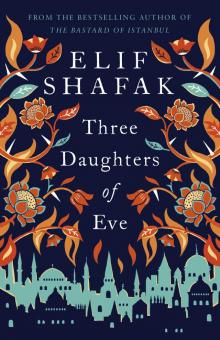 Three Daughters of Eve
Three Daughters of Eve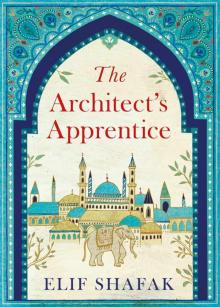 The Architect's Apprentice
The Architect's Apprentice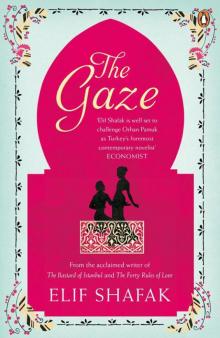 The Gaze
The Gaze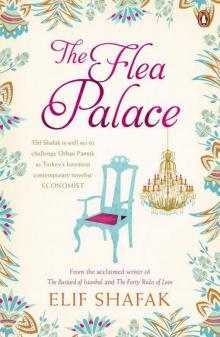 The Flea Palace
The Flea Palace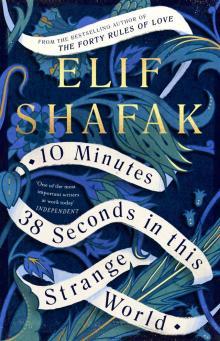 10 Minutes 38 Seconds in this Strange World
10 Minutes 38 Seconds in this Strange World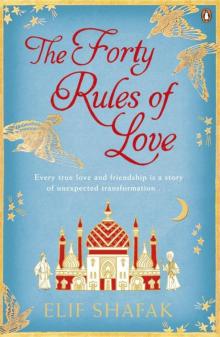 The Forty Rules of Love
The Forty Rules of Love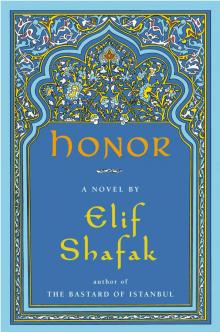 Honor
Honor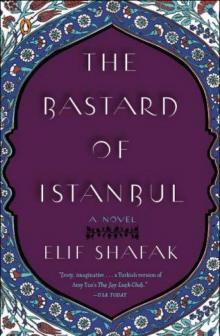 The Bastard of Istanbul
The Bastard of Istanbul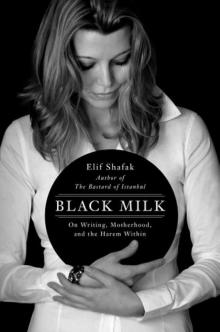 Black Milk
Black Milk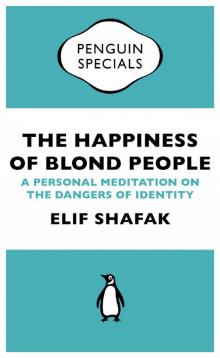 The Happiness of Blond People (Penguin Specials)
The Happiness of Blond People (Penguin Specials)